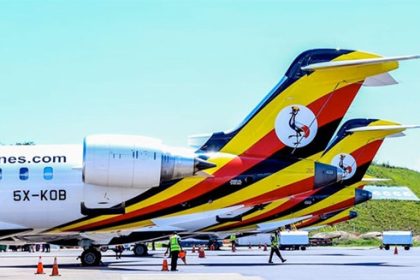Air Senegal’s financial troubles escalate as french bank moves to seize two A330neos

The escalating crisis at Air Senegal underscores a broader industry dilemma: the high-stakes vulnerability of airlines that depend heavily on leased aircraft. While leasing offers flexibility and lower upfront costs, it also exposes carriers to swift repossession, mounting arrears, and operational paralysis when finances tighten. As African airlines navigate thin margins and volatile cashflows, the reliance on leased fleets is becoming both a lifeline — and a looming risk.
Air Senegal’s deepening financial crisis has entered a new phase after French state-backed investment bank Bpifrance initiated legal proceedings to reclaim two Airbus A330neo aircraft it helped finance, signalling growing concern among the airline’s creditors and foreign partners.
The legal action, filed quietly in French courts, seeks to enforce the bank’s rights over the wide-body jets—assets for which Bpifrance provided export-credit guarantees in 2020. Although Air Senegal operates the aircraft under lease, ownership legally remains with the financiers until all payments are completed. Persistent arrears now place the aircraft at risk of repossession.
According to a story by Africa Intelligence, Bpifrance has spent months urging Air Senegal to address overdue payments linked to the A330neo financing package. Early this year, the airline had accumulated more than €14 million in outstanding dues tied not only to the two wide-bodies but also to two ATR 72-600s in its fleet.
Neither Bpifrance nor France’s finance ministry has confirmed whether any portion of the debt has since been settled, adding to uncertainty around the airline’s financial position.
This is not the first dispute the carrier has faced with lessors. In June, two Airbus A321s operated by Air Senegal were grounded in Dakar after Irish leasing firms—represented by Carlyle Aviation—sought to enforce payment of €1.5 million in arrears.
The potential seizure of the A330neos would have limited immediate operational impact, as both aircraft are currently out of service—one undergoing maintenance in Naples and the other grounded in Dakar due to technical faults.
Nevertheless, the situation sharpens pressures on Air Senegal, which has increasingly turned to short-term ACMI (aircraft, crew, maintenance and insurance) leases to maintain its international schedule. The stopgap measure is costly and has further strained an airline already burdened by an estimated €150 million in debt.
In recent weeks, the company has even seconded some of its own staff—including pilots—to Air Côte d’Ivoire in an effort to cut operating costs, a decision that has provoked criticism within Senegal’s political establishment.
The airline’s precarious finances have become a political flashpoint in Dakar. Influential MP Guy Marius Sagna questioned the national carrier’s viability during a parliamentary session in early November—remarks interpreted by some observers as aligning with Prime Minister Ousmane Sonko, who has long pushed for a change in leadership at the airline.
Sonko is reportedly seeking the removal of Air Senegal CEO Tidiane Ndiaye, who retains the confidence of President Bassirou Diomaye Faye. The standoff has unfolded amid broader tensions between the president and the prime minister.
Despite criticism, the government has continued to back the airline’s long-term expansion plans. Transport Minister Yankhoba Diémé announced during the Dubai Airshow that Senegal intends to acquire nine Boeing 737 Max 8 aircraft—a move that raised eyebrows given the country’s fragile fiscal position and the freeze of its programme with the International Monetary Fund.
The Bpifrance lawsuit also carries diplomatic implications. Senegal and France have only recently begun repairing relations following a rupture earlier this year over defence cooperation. President Faye’s visit to Paris in September was viewed as a sign of improving ties.
However, the enforcement action by a major French state institution—closely monitored by France’s Minister of Economy and Finance—risks complicating the fragile rapprochement.
While seizure of the grounded jets may not immediately disrupt operations, the legal action underscores a larger concern: Air Senegal’s financial model is under severe strain, and its reliance on costly short-term leases is unsustainable.
With creditors becoming more assertive and political tensions swirling around its leadership, the national carrier faces mounting pressure to stabilise its finances—or risk deeper turbulence ahead.


 Equity Bank Uganda set to close 2025 on firmer footing as clean-up phase gives way to growth
Equity Bank Uganda set to close 2025 on firmer footing as clean-up phase gives way to growth
 USA–Canada certification dispute could expose Uganda and regional airlines to regulatory risk
USA–Canada certification dispute could expose Uganda and regional airlines to regulatory risk
 KPMG flags widening execution gap as tech leaders bet on AI maturity, talent and partnerships
KPMG flags widening execution gap as tech leaders bet on AI maturity, talent and partnerships
 Destination Uganda clinches “Best in Show – Africa” at New York Travel & Adventure Show
Destination Uganda clinches “Best in Show – Africa” at New York Travel & Adventure Show
 Uganda’s Kibirige edges closer to global golf stage after strong PGTI Q-School showing in India
Uganda’s Kibirige edges closer to global golf stage after strong PGTI Q-School showing in India
 Breathtaking Uganda unveils curated Easter getaway to Zanzibar
Breathtaking Uganda unveils curated Easter getaway to Zanzibar